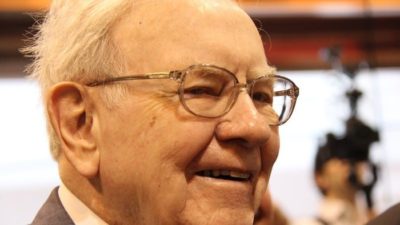Peter Lynch didn't just beat the Street … he absolutely destroyed it.
Reflect on his record for a second. Lynch ran Fidelity's Magellan Fund from 1977 to 1990, beating the S&P 500 in all but two of those years. He averaged annual returns of 29%. That's a mind-blowing figure. It means that $1 grew to more than $27; if you invested as little as $37,000 with him in 1977, you were a millionaire in 1990.
Fortunately for us, he's willing to share his secrets. To achieve his stunning track record, he clung to eight simple principles. Here they are.
1. Know what you own
Seems elementary, right? But as someone who talks to lots of investors, I can report that you'd be shocked at how few investors actually do their research. Scroll down to No. 7 for a good first step in getting ahead of the game.
2. It's futile to predict the economy and interest rates (so don't waste time trying)
After 2008's crash, I noticed a distinct increase in armchair economists. We financial types do enjoy water cooler talk about interest rates, trade deficits, debt levels, etc. But there's a danger in converting thought into action.
The Australian economy is an extraordinarily complex system, with millions of people acting in their own self-interest and responding to each others' actions, government incentives, and external shocks. And that's before we factor in our increasingly diverse interactions with the rest of the world.
Trying to time the market is futile. Set up a financial plan that allocates your assets based on your risk tolerance, so that you can sleep at night.
3. You have plenty of time to identify and recognize exceptional companies
Lynch mentions that Wal-Mart (NYSE: WMT) was a 10-bagger – i.e. its stock rose to 10 times its initial price – 10 years after it went public. Even if you missed the initial ten-bagger and bought Wal-Mart after waiting a decade, you'd be sitting on a 100-bagger.
Some would argue that it's still not too late to get in on Wal-Mart, decades after going public. While the company's no longer a monster growth story, it continues to crank out 20% returns on equity year after year. That type of consistent ROE is a huge positive indicator of management's ability to effectively allocate capital.
I could tell a similar tale about CSL's (ASX:CSL) early growth years, right on down to its still-impressive current return on equity of 24%
And Fortescue Metals Group (ASX:FMG), even if you missed the first 100-bags as Fortescue climbed from $0.01 to $1.00, Fortescue went on to be a 12-bagger and is currently a 6-bagger.
The lesson of Wal-Mart, CSL, and Fortescue? You don't need to immediately jump into the hot stock you just heard about. There's plenty of time to do your research first. See secret No. 1.
4. Avoid long shots
Lynch claims he was 0-for-25 in investing in companies that had no revenue but a great story. Remember, the guy who averaged 29% returns went oh-fer on long shots. You and I are unlikely to do much better.
I've said it before, and I'll say it again. Use companies with proven track records as your baseline. QBE Insurance Group (ASX:QBE), BHP Billiton (ASX:BHP), and Telstra Corporation (ASX:TLS) are selling for 10, 8, and 10 times trailing earnings, respectively. This is what the market is charging for solid, low-to-moderate-growth companies that dominate (or at least co-dominate) their spaces. Expect to pay more for higher-growth prospects, but make sure the risk-reward trade-off on an unproven company is worth it.
5. Good management is very important; good businesses matter more
The pithier Lynchism is: "Go for a business that any idiot can run – because sooner or later, any idiot is probably going to run it."
For a prototypical example of a so-easy-a-caveman-could-run-it company, think the aforementioned Telstra. I know many Telstra investors think a caveman has already run the company.
6. Be flexible and humble, and learn from mistakes
Lynch has said: "In this business, if you're good, you're right six times out of 10. You're never going to be right nine times out of 10."
You're going to be wrong. Diversification and the ability to honestly analyse your mistakes are your best tools to minimize the damage.
7. Before you make a purchase, you should be able to explain why you're buying
Specifically, you should be able to explain your thesis in three sentences or less. And in terms an 11-year-old could understand. Once this simply stated thesis starts breaking down, it's time to sell.
As Lynch said in 'Beating the Street', "Never invest in any idea you can't illustrate with a crayon."
8. There's always something to worry about.
Lynch noted that investors made a killing in the 1950s despite the very new threat of nuclear war. There are plenty of fears to choose from right now, but we've survived a Great Depression, two world wars, an oil crisis, and double-digit inflation.
Always remember, if our worst fears come true, there'll be a heck of a lot more to worry about than some stock market losses. Lynch's parting shot is that investing is more about stomach than brains.
Peter's principles in action
So there you have it. These are the eight principles Peter Lynch used to bring the market to its knees. They seem simple, but trust me, sticking to them is harder than it sounds.
Our subscription service will apply the lessons of the masters — Lynch, Warren Buffett, et al. The advisors will take their time and look to identify those truly exceptional companies Peter Lynch talked about.
If this kind of investing agrees with you, I invite you to join us and take a free subscription to Motley Fool Australia's free Take Stock email.
Dean Morel is The Motley Fool's Investment Analyst. Dean holds a position in Telstra. The Motley Fool's disclosure policy lets you know what we own.
Based on this article by Anand Chokkavelu published at Fool.com.








